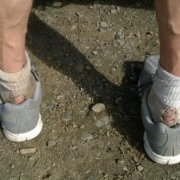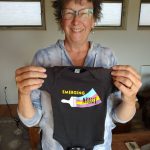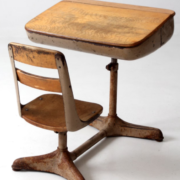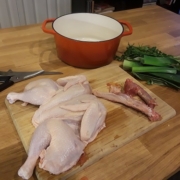Authenticity in a Pair of Socks
Authentic. We bash that work around a lot, and like great sex and a Tesla, it’s what what everyone wants.
Stu was telling me about some tourism ads he heard about the other day for Pendleton, Oregon, targeted at hipsters who want a handmade, authentic experience: real cowboy stuff, handmade saddles and blankets, which you might really want if you had a horse, but I haven’t seen too many hipsters riding them in downtown Portland. This seems to me to be people thinking too hard about authenticity, rather than just being authentic.
Stu and I took a hike today. We’d been working in the yard all morning, and were still in our hauling-rocks-in-the-rain attire, which for Stu, included wearing these socks. He keeps all his old socks in a drawer in his night stand. I don’t know why he puts them there, but it’s as if he knows they would be shunned by his decent socks, across the room in the tallboy dresser. I don’t know why he keeps them at all, but there they are. This is authentically Stu. No artifice, no worry that the people at Solera Brewery, where we decamped after the hike, but might wonder about a guy in homeless-person socks, a threadbare sweatshirt, $5 Walmart basketball shorts and a 25-year-old gimme cap from a pharmaceutical firm, was doing filling a bowl from the popcorn machine. He didn’t need to think about it, because that’s just who he is. And because Solera is a real place (read: authentic) no one gave him the slightest of inspection.
What is authentic food? I have wondered about this a lot, in a world where it is possible to buy fish sauce, epazote, dried grasshoppers, Argentine wine, Israeli feta cheese, reindeer sausage and kalamansi limes, all within a few miles of home, or closer still, from Amazon.
If you crack the code of another culture’s most famous dish … Spanish paella, say, or Brazilian feijoada or Chinese scallion cakes, and you make them in your own kitchen, as close to the original as you can with what you have at hand, trying hard to honor that dish, what is it that you have in the end? Is it authentic? Or is it, “buzz … thanks for playing! better luck next time!”
I have never been to India. At Nora’s Table, we worshiped Indian food. We gave it our all. We ground our own spices, we toasted them in a pan. We browned our onions for curries until the edges were deep brown. We made paneer from whole milk and a little vinegar. We brought in chick pea flour and kari leaves and nigella seeds. And then we passionately threw in what grows here. No New Dehlian has ever had pear chutney. But we honored the idea of chutney, slavishly, with Gorge pears. And when I saw Indians in our dining room, I would often go out to say hello. And here’s what they often said to me. “I have never had a dish like that in India, but it was so perfect, so real, so amazing. Thank you.” Authentic.
And that is what authentic means to me now. It is making food as honest as you can, with what you have. And if you do that well, the real owners of that cuisine will recognize what you have created. It will be real to them, as if their aunt had made their favorite dish, but maybe just got creative one night and took it in another direction.
If we have trouble defining what authentic is, it is surely much easier to say what it’s not. It ain’t “Limited Edition” carrots from Andrew & Williamson Fresh Produce of San Diego, grown in Mexico and distributed in Alaska, Arizona, Arkansas, California, Colorado, Florida, Idaho, Illinois, Kansas, Kentucky, Louisiana, Minnesota, Mississippi, Montana, Nevada, New Jersey, New Mexico, Oklahoma, Oregon, South Carolina, Texas and Utah. The shipping cost a pretty penny, but the salmonella was free last month. The carrots sickened 285 people and killed one. Not sure what makes this a limited edition, but perhaps it’s because the carrots didn’t sicken or kill people in the other 24 states.
If we want authenticity, the real deal, then we need to stop buying carrots that qualify for frequent flier miles. Yes, you are correct, a kari leaf will never grow in the Columbia River Gorge. And in my passion for Indian food, I will find a way to keep a package, grown somewhere in Florida, in my freezer. And there will likely always be a lime in my refrigerator. But there is a line to be drawn, a way to know that those holey socks are authentic. If we stand back and look, we can see where that line is. In a world that craves the real, the honest, the enduring life, we have to draw the line.


 Two passions: food, words. Some days, it’s a tug of war, some days, a peaceful coexistence.
Best day ever? Create it, cook it, eat it, write about it. I sold my restaurant, Nora’s Table, in 2015, and now I can be possessed by anything in the long day that I choose: writing 400 words, creating the next menu for the Chefs Collective at Ruby June Inn, teaching a cooking class at Jacob Williams Winery, or tromping through the fields with farmer Laurel Bouret.
A rainy afternoon with a foundational cookbook, such as Marlene Mater’s fabulous “Allepo Cookbook” or Michael Ruhlman and Brian Polcyn’s “Charcuterie” can feed my spirit and spark my creative power. So can reading Maggie Shipstead, Michael Chabon or Alison Kraus.
I live in Hood River, Oregon, with Stuart, also known as the Happy Meal Man. In other words, all I can desire. And then there’s Satchel, our six-year old Idaho Shag who is simply the world’s best dog. We run together, and sometimes, we even let Stu join us.
Our oldest daughter Annie and grandson Levi live in Eugene, Oregon. Annie is cooking in restaurants, like her Mom. Son Max and his wife Hannah and our granddaughter Shiloh are in Portland, where he is a school principal. It’s a good tribe, all the way around.
Two passions: food, words. Some days, it’s a tug of war, some days, a peaceful coexistence.
Best day ever? Create it, cook it, eat it, write about it. I sold my restaurant, Nora’s Table, in 2015, and now I can be possessed by anything in the long day that I choose: writing 400 words, creating the next menu for the Chefs Collective at Ruby June Inn, teaching a cooking class at Jacob Williams Winery, or tromping through the fields with farmer Laurel Bouret.
A rainy afternoon with a foundational cookbook, such as Marlene Mater’s fabulous “Allepo Cookbook” or Michael Ruhlman and Brian Polcyn’s “Charcuterie” can feed my spirit and spark my creative power. So can reading Maggie Shipstead, Michael Chabon or Alison Kraus.
I live in Hood River, Oregon, with Stuart, also known as the Happy Meal Man. In other words, all I can desire. And then there’s Satchel, our six-year old Idaho Shag who is simply the world’s best dog. We run together, and sometimes, we even let Stu join us.
Our oldest daughter Annie and grandson Levi live in Eugene, Oregon. Annie is cooking in restaurants, like her Mom. Son Max and his wife Hannah and our granddaughter Shiloh are in Portland, where he is a school principal. It’s a good tribe, all the way around.
